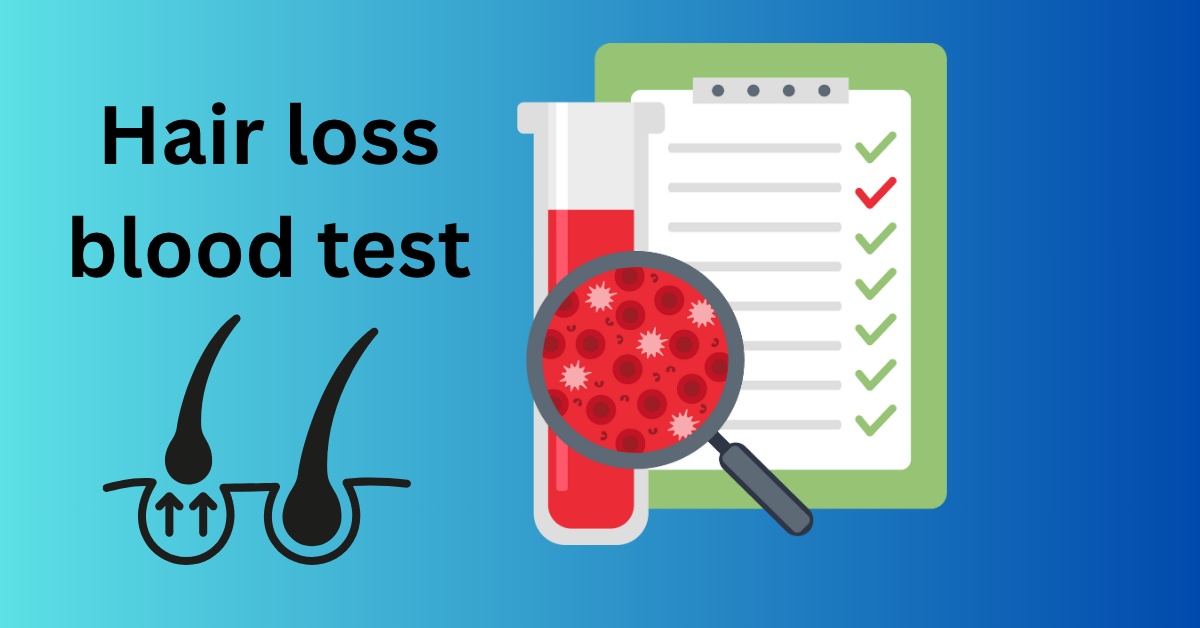A hair loss blood test is the way to diagnose the cause of your hair loss. Almost the maximum population of both men and women suffers from this common issue.
1. Why Blood Tests for Hair Loss Matter
- Everything has a reason. In hair loss, there are multiple reasons.
- Knowing the exact cause helps achieve quicker and more effective treatment.
-
Early testing prevents unnecessary treatments.
2. Key Blood Tests for Hair Loss
-
Complete Blood Count (CBC) – detects anemia.
-
Ferritin / Iron Studies – iron deficiency is a common cause.
-
Vitamin D & B12 Levels – essential for hair growth.
-
Thyroid Function Tests (TSH, T3, T4) – thyroid imbalance can trigger shedding.
-
Hormonal Tests (Testosterone, DHT, Estrogen, Progesterone) – for pattern hair loss.
3. Detail view of blood test
a) CBC (Complete Blood Count)
What is the role of CBC?
-
Detects Anemia (Low Hemoglobin)
-
Low hemoglobin or red blood cell count means your hair follicles are not getting enough oxygen and nutrients.
-
Iron-deficiency anemia is one of the most common yet often overlooked causes of hair shedding in women.
-
-
Reveals Nutritional Deficiencies
-
While CBC doesn’t show all nutrients, abnormal counts can indicate poor nutrition or a chronic illness, prompting further tests such as ferritin, B12, or folate.
-
-
Identifies Infections or Inflammation
-
High white blood cell counts indicate infections or inflammation in the body, which can trigger temporary hair loss (telogen effluvium).
-
-
Overall Health Check
-
Hair loss can be an early sign of some systemic health issues. CBC helps rule out serious conditions before moving to more advanced tests.
-
b) Ferritin test and Iron studies
1. Ferritin Test (Iron Storage Marker)
-
What it is: Ferritin is a protein that stores iron in your body.
-
Why it matters:
-
Low ferritin means your body’s iron reserves are low, even if your hemoglobin is normal.
-
Hair follicles need iron to grow strong and healthy; a deficiency can trigger telogen effluvium (diffuse hair shedding).
-
-
Ideal levels for hair growth:
-
Studies suggest ferritin should be above 50–70 ng/mL for optimal hair growth.
-
2. Iron Studies
This usually includes:
-
Serum Iron – Measures the amount of iron in your blood.
-
Total Iron Binding Capacity (TIBC) – Shows how well your blood can transport iron.
-
Transferrin Saturation – Percentage of iron bound to transport proteins.
Why it matters:
-
Identifies iron-deficiency anemia or poor iron absorption, both of which can cause hair thinning.
c)Vitamin D & B12 Levels
- Why vitamin D and vitamin B12 matter:
- Vitamin D- low vitamin D level weakens hair follicles, resulting in changes in the hair growth cycle.
- Vitamin B12– it is necessary for red blood cell formation, and indirectly, low vitamin B12 leads to insufficient oxygen and nutrient supply to hair follicles.
d) Thyroid function test
The thyroid gland controls many functions, one of which is hair follicle activity. Disrupting thyroid hormone can disturb the hair cycle.
- How does Thyroid hormone play a role in hair fall and hair thinning?
- In Hypothyroidism
-
Hormones affected: Low T3 and T4, high TSH
-
Hair loss pattern:
-
Diffuse thinning across the scalp (telogen effluvium)
-
Coarse, dry, brittle hair
-
Loss of the outer third of the eyebrows (Hertoghe’s sign)
-
-
Why does it happen?
-
Reduced metabolism slows hair follicle turnover.
-
Poor blood circulation and nutrient delivery to hair roots.
-
- In Hyperthyroidism
- Hormones affected: High T3 and T4, low TSH
-
Hair loss pattern:
-
Rapid hair shedding, fine and soft hair texture
-
Often associated with stress-related shedding (telogen effluvium)
-
- Why does it happen?
- Accelerated metabolism pushes hair follicles into a resting phase too quickly.
e)Hormonal Tests (Testosterone, DHT, Estrogen, Progesterone)
1. Testosterone
-
Role in hair loss:
-
In men, high levels can convert to DHT, which shrinks hair follicles.
-
In women, excess testosterone (as in PCOS) can cause hair thinning at the crown and frontal scalp.
-
-
Why test: Detects androgen excess in cases of female pattern hair loss.
2. Dihydrotestosterone (DHT)
-
Role in hair loss:
-
DHT is the most potent androgen responsible for male and female pattern baldness.
-
It shortens the growth (anagen) phase and causes miniaturization of hair follicles.
-
Miniaturization means your hair strands slowly become thinner, weaker, and shorter over time.
-
-
Why test: Confirms androgenic activity that triggers hair follicle sensitivity.
3. Estrogen (Estradiol)
-
Role in hair health:
-
Estrogen helps maintain the hair growth phase and gives hair volume.
-
Low estrogen levels (postpartum, perimenopause, or menopause) can lead to shedding.
-
-
Why test:
-
Useful in women with diffuse hair loss to rule out hormonal fluctuations.
-
4. Progesterone
-
Role in hair health:
-
Balances estrogen and limits the effect of excess androgens.
-
Low levels can worsen androgen-driven hair thinning.
-
-
Why test:
-
Helpful in women with irregular cycles, PCOS, or perimenopausal hair loss.
-
When Hormonal Testing is Recommended
-
Sudden or severe hair thinning in women (especially on the crown/front)
-
Accompanied by acne, irregular periods, weight gain, or hirsutism
-
Early-onset pattern hair loss in men
4. Consult with Your Doctor
- “Avoid self‑diagnosis or self‑treatment—hair loss requires expert evaluation. Every patient should undergo a proper clinical examination before any tests. Test results must be interpreted carefully to create a personalized treatment plan, which can include medication, a balanced diet, and even stress‑management practices like meditation to prevent stress‑related hair fall.”
Conclusion:
-
Take a proactive approach if you are having a hairfall issue, consult a healthcare practitioner or dermatologist, or trichologist
-
healthy lifestyle + timely tests = better hair health.
References:
- https://www.google.com/url?sa=t&source=web&rct=j&opi=89978449&url=https://www.healthline.com/health/blood-tests-for-hair-loss&ved=2ahUKEwjgl73rw_OOAxX7zDgGHVysB-AQFnoECDMQAQ&usg=AOvVaw1qpjkY2Zo2FJBHHl-Lx0pZ.

